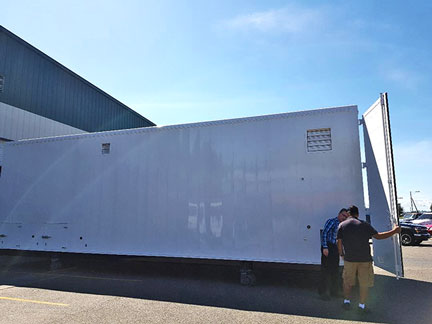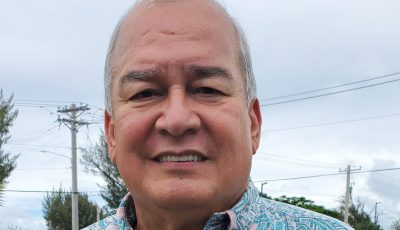‘It’s time for NMI to take initiative with food security’

File photo shows TriVan Truck Body and Friesla president Bob Lodder showing details of a mobile meat processing unit to Sen. Jude U. Hofschneider (R-Tinian) at the company’s production facility in Ferndale, Washington. The unit, which was procured through Imperial Pacific International (CNMI) LLC’s Community Benefit Fund, is already on Tinian for the island’s slaughterhouse project. Tinian is now working with experts to make the facility U.S. Department of Agriculture-certified. (Contributed Photo)
Seeing the many border closures and other experiences arising from the global experience of the COVID-19 pandemic, Sen. Jude U. Hofschneider (R-Tinian) believes it is time for the CNMI to take the initiative for its own food security to ensure it is not overly dependent on imported food.
Hofschneider talked about the need for the CNMI to have food security in an interview Monday during which he gave an an update on the slaughterhouse project on Tinian.
The senator said there is a need to establish the food security initiative to give each different islands in the CNMI a stake in it. He cited Rota as an example, saying it is doing great in creating produce such as potato.
“So we need to maximize that potential and support them,” Hofschneider said.
In Tinian’s case, he said, everyone is into cattle ranching. With a new slaughterhouse on the island, Tinian needs to maximize its meat production, he said.
He said Saipan can also be a source of food production. “Example, if we close our borders for three months, we need to figure out how to feed our population here and based on what we have here.” This is why now is the right time to pursue a food security initiative for the CNMI, he added.
Hofschneider said this is also why he and other Tinian leaders are pushing for the success of the modular slaughterhouse. The way to make it successful, he said, is to make sure to do things in accordance with the U.S. Department of Agriculture codes, food security, and the sustainability of the production of the beef or cattle.
Hofschneider said the slaughterhouse is a pre-fabricated modular unit, but was assembled in Ferndale, Washington and then shipped to a container house. He said the slaughterhouse was procured through Imperial Pacific International (CNMI) LLC’s Community Benefit Fund.
“What the municipality is doing right now is building the components, the shelter and all the other needed components to be able to come closer to opening it for operations,” the senator said.
Hofschneider said they still need to get all the other certifications from USDA, which are crucial in operating the facility. “So that’s where it is at right now. We’re working with experts to see how we can have it certified and also making sure that the products, the cattle that are coming in are healthy,” he said.
The senator said certifications are important so when they start the operations of the slaughterhouse, then the meats are USDA certified and deemed safe for consumption.
He said it has been the desire of the Tinian community, primarily the ranchers, to have one slaughterhouse unit, and IPI’s Community Benefit Fund was an opportunity for them to get that.
Hofschneider said that’s his been Ramon Dela Cruz’s vision since he became mayor of Tinian—to have a USDA-certified slaughterhouse operation.
He said when the opportunity arose for the municipality to get one, it so happened that the CBF became the funding source for that. The senator said approximately $450,000 in CBF was donated to the Tinian Cattleman’s Association for the slaughterhouse.
“We would like to open in as quickly as possible but, of course, we cannot [do that] until we have all those certifications,” he said.
Hofschneider said they want to make sure that, if they are going to continue subsidizing the slaughterhouse using government funds, they need to get all necessary elements in place so that when it’s open, it’s sustainable. This, he said, will be enable the producers and ranchers to continue with their grazing and, at the same time, safely and consistently market the end product.
The way they look at it, and because of the limited number of cattle heads, Hofschneider said they are looking at Tinian and Saipan as the main market first for grass-feed beef. Once operations are established, the Tinian Slaughterhouse will have the capacity to process both cattle and pork in an efficient and sanitary manner, Hofschneider
Last August, Tinian Mayor Edwin P. Aldan said the CBF money went to Tinian Cattleman’s Association to procure the slaughterhouse unit for the benefit of the community.
Aldan said the slaughterhouse is already built but yet to open because they want to make sure that they comply with all the requirements.
Last June, the Tinian leadership presented the Strategic Plan for the Tinian Beef Industry to the Tinian community.



























